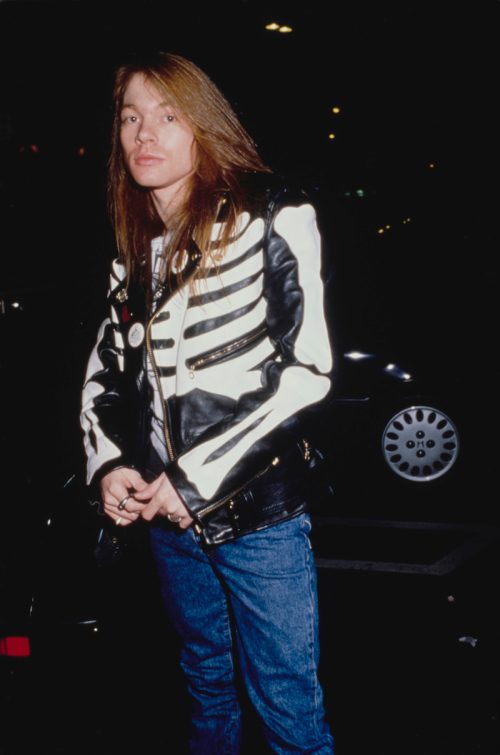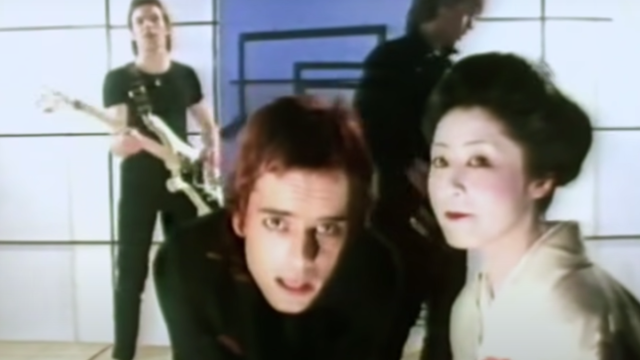7 Hit '80s Songs That Are Offensive by Today's Standards
Some of them were major hits, but they'd be received much differently now.
It's a hard fact to process, but the '80s began over 40 years ago. And in the decades that have passed since, some entertainment that wasn't given a second thought at the time is considered inappropriate today, as people have become more educated and aware of different viewpoints and experiences. These reconsidered pieces of media include everything from politically incorrect movie quotes to outdated storylines on TV shows. And while some offensive moments from the past are lost to time, when it comes to the most popular songs of the '80s, many uncomfortable ones live on as classics.
Some songs from the past are clearly inappropriate today, but others have become so ingrained in pop culture that you might not have realized just what you've been singing along to. Read on for seven songs from the '80s that are offensive by the standards of 2023.
READ THIS NEXT: 8 '90s Hit Songs That Are Offensive by Today's Standards.
1
"Don't Stand So Close to Me" by The Police (1980)
"Don't Stand So Close to Me" is an enduring hit for The Police, but have you ever really stopped to take in the lyrics? They tell the story of a teacher who desires a student.
The opening lines are "Young teacher, the subject/Of schoolgirl fantasy" and the song goes to reference how "this girl is half his age." The lyrics also name-check writer Vladimir Nabokov, who wrote Lolita, a novel about a teacher who sexually abuses his young stepdaughter.
In May 2023, Police lead singer and songwriter Sting looked back on the song in a People interview. The artist was a teacher prior to making it big as a musician, but he assured the magazine that "Don't Stand So Close to Me" is not about him.
"It's certainly not biographical, but people having relationships with teachers, it definitely happens," he said. "And in the song's defense, nothing happens. It's just the danger of, something happens and the teacher is aware of it, which is why he's saying, 'Don't stand so close to me.'"
Sting added that the song could be interpreted "many, many different ways," but said that he has decided to no longer perform it live. "[I]n the current climate, I don't sing that live. People with a sort of puerile sensibility will say, 'Oh it's about you.' And of course it's not, but it's an interesting situation," he explained.
2
"Dude (Looks Like a Lady)" by Aerosmith (1987)
Songwriter Desmond Child said in a 2012 interview with Songfacts that "Dude (Looks Like a Lady)" was inspired by Aerosmith lead singer Steven Tyler mistaking Vince Neil from Mötley Crüe for a woman when he saw him at a bar because of Neil's long hair. The lyrics and music video, though, take the song into transphobic territory. Both contain confused depictions of either a transgender woman or a cross-dresser. Either way, a person is described as tricking someone into believing they are a gender they are not, which perpetuates stereotypes about trans people.
The lyrics include, "So never judge a book by its cover/Or who you gonna love by your lover/Sayin', love put me wise to her love in disguise/She had the body of a Venus/Lord, imagine my surprise."
Child explained to Songfacts that Aerosmith's Joe Perry was concerned about insulting the gay community. "I said, 'Okay, I'm gay, and I'm not insulted. Let's write this song.' So I talked them into the whole scenario of a guy that walks into a strip joint and falls in love with the stripper on stage, goes backstage and finds out it's a guy. But besides that, he's gonna go with it. He says, 'My funky lady, I like it, like it, like it like that.' And so he doesn't run out of there, he stays. It's funny, because they used that song in Mrs. Doubtfire, and then it was like every four- or five-year-old child in America was able to sing that song. It was like; do you realize this is about a [outdated slang term for a transgender person]?" Child added that he believes "Dude (Looks Like a Lady)" is "a very accepting song" with "a moral that says never judge a book by its cover."
3
"Money for Nothing" by Dire Straits (1985)
"Money for Nothing" was a big hit for Dire Straits, but the reason it's unlikely you'll hear it out in the world unedited is clear: The lyrics include three uses of the f-slur.
The song describes the type of music and musicians that have been successful on MTV. Lyrics referring to an anonymous pop star read, "See the little [expletive] with the earring and the makeup?/Yeah buddy, that's his own hair/That little [expletive] got his own jet airplane/That little [expletive], he's a millionaire."
The Guardian reported that lead singer and songwriter Mark Knopfler reflected on hearing criticism of the lyrics back when the song came out. He said in an interview that he received "an objection from the editor of a gay newspaper in London." In performances of the song, the band has replaced the slur with other words, including "queenie."
Connecting this Dire Straits track to another offensive song on our list, Vince Neil once claimed to the Las Vegas Review-Journal that this song is also about him, too.
For more celebrity news delivered right to your inbox, sign up for our daily newsletter.
4
"One in a Million" by Guns N' Roses (1988)

Appropriately, there are about a million ways in which "One in a Million" by Guns N' Roses is offensive. The song includes the f-word, the n-word, and multiple xenophobic insults about immigrants, making it not just offensive by today's standards, but shocking back when it was released in 1988. The difference is that it would be released to even more backlash today.
Lyrics include, "Police and [n-word], that's right/Get outta my way/Don't need to buy none of your/Gold chains today" and "Immigrants and [f-word]/They make no sense to me/They come to our country/And think they'll do as they please/Like start some mini Iran/Or spread some [expletive] disease."
"I used a word that was taboo. And I used that word because it was taboo," singer Axl Rose told Rolling Stone in 1992. "I was pissed off about some Black people that were trying to rob me. I wanted to insult those particular Black people. I didn't want to support racism. When I used the [f-word], I wasn't coming down on gays. I was coming down on an element of gays … I've had my share of dealings with aggressive gays." Rose also pointed out that the album artwork contained an apology for the song addressed to "those who may take offense."
5
"Turning Japanese" by The Vapors (1980)
"Turning Japanese" by The Vapors is a complicated case, because the song has been interpreted in different ways. For one, it was widely rumored that the song is about masturbation and that "turning Japanese" refers to a facial expression. The band discredited this theory.
"I wrote 'Turning Japanese' in my flat, but couldn't get the chorus right," singer and songwriter David Fenton told The Guardian in 2023. "One night, I woke up at 4 a.m. with the words 'Turning Japanese, I think I'm turning Japanese' in my head. I wrote them down, then fell asleep, and the lines still worked for me the following day." Fenton added, "I was interested in Japanese culture and we had a song called 'Letter from Hiro', named after a photographer we met in Japan. But the words and the song's title didn't really mean much. It was intended purely as a love song. The protagonist is sitting in his bedroom, which has become like a prison cell, pining over a photograph of his ex-girlfriend."
According to Songfacts, Fenton told VH1, "'Turning Japanese' is all the clichés about angst and youth and turning into something you didn't expect to."
"No sex, no drugs, no wine, no women/No fun, no sin, no you, no wonder it's dark," the lyrics read. "Everyone around me is a total stranger/Everyone avoids me like a psyched Lone Ranger/Everyone/That's why I'm turning Japanese".
Even if the song is not mocking Japanese facial features, it was still a metaphor about disillusionment and foreignness written by a white man. The music video is also offensive, featuring Fenton pulling his eyelids to the side while standing next to a woman wearing traditional Japanese clothing.
6
"Do They Know It's Christmas?" by Band Aid (1984)
"Do They Know It's Christmas?" was recorded for a good cause, but its lyrics are harmful. The song is by Band Aid, a supergroup including Bono, George Michael, Phil Collins, and Sting, among many more famous musicians. The song was meant to help with famine in Ethiopia. Unfortunately, the songs lyrics characterize the whole of Africa as an entirely negative place.
"There won't be snow in Africa this Christmas time/The greatest gift they'll get this year is life," the group sings. "Where nothing ever grows/No rain nor rivers flow/Do they know it's Christmas time at all?" Another line that stands out is, "Well, tonight thank God it's them instead of you."
Since the original song came out, four more versions have been released that each raised money for charitable causes. The most recent was in 2014, to help with the Ebola crisis. Ghanaian-English musician Fuse ODG wrote a piece for The Guardian about why he chose not to participate in the recording.
"For the past four years I have gone to Ghana at Christmas for the sole purpose of peace and joy," Fuse ODG wrote. "So for me to sing these lyrics would simply be a lie." He continued, "In truth, my objection to the project goes beyond the offensive lyrics. I, like many others, am sick of the whole concept of Africa—a resource-rich continent with unbridled potential—always being seen as diseased, infested and poverty-stricken."
7
"Seventeen" by Winger (1988)
Any song about a adult man pursuing a 17-year-old girl would be questionable today, but Winger's hit is especially eyebrow-raising, with lyrics like, "She's only 17/Daddy says she's too young but she's old enough for me" and "Yes, such a bad girl, loves to work me overtime/Feels good dancin' close to the borderline."
Lead singer and co-songwriter, Kip Winger, was 27 at the time "Seventeen" was released. In 2014, he defended the lyrics to Songfacts. "And look, 17 was legal in Colorado [his home state], so I didn't even get the joke, dude," he said. "I didn't get it. And then it hit and every 17-year-old girl in the United States thought that song was about her. So, I did well. [Laughing]".
Winger has also shared that he was inspired by the 1963 Beatles song "I Saw Her Standing There."
"When I wrote that song, I didn't even know that 17 was underage," Winger told Metal Sludge. "I was just taking my cue from that Beatles line, "She was just 17 and you know what I mean." I was completely oblivious!"






















